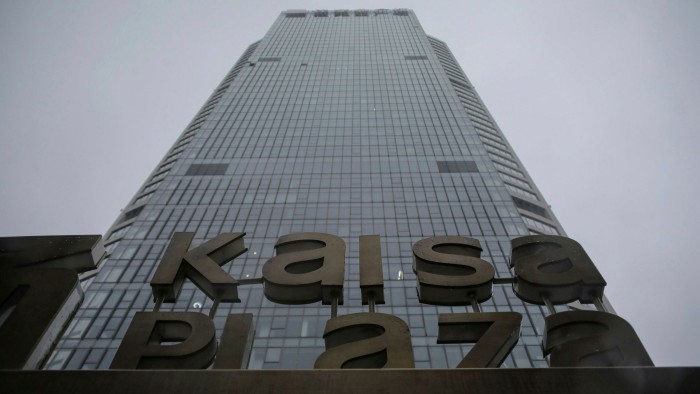Chinese developer Kaisa faces crucial payment deadlines

Simply sign up to the Property sector myFT Digest -- delivered directly to your inbox.
Chinese property developer Kaisa faces two crucial payment deadlines by Friday, presenting a new flash point for global investor concerns that have been heightened by a sharp sell-off in property groups’ offshore debt.
S&P lowered its rating of the company, which has $88m in coupon payments due by Friday, to triple C minus, saying it “may not be able to service its debt in time” and pointing to a potential debt restructuring.
Kaisa is the sector’s second-biggest borrower on international high yield markets after Evergrande and pleaded with investors this week for more time after payments were missed on wealth management products it guarantees.
Holders of some bonds in Evergrande, the world’s most indebted property developer, said they had received payments before a 30-day grace period expired on Wednesday. Evergrande did not respond to a request for comment.
The Kaisa deadlines are the latest strain on the Chinese property sector, which is reeling from a liquidity crisis following a severe sell-off in developers this week that pushed borrowing costs on riskier offshore bonds to their highest level since the financial crisis.
“Based on Kaisa’s recent statements, it seems probable that it will enter the grace period for its USD coupon due today,” said Paul Lukaszewski, head of corporate debt for Asia-Pacific at Abrdn.
Property companies are under pressure from Beijing to reduce their debts, with several defaulting in the past month at a time when property sales had slowed. Distress across China’s real estate sector forced yields on bonds issued by the country’s riskier offshore borrowers to hit 29 per cent this week, compared with 14 per cent at the start of September — their highest level since 2008-09.
Chinese developers are almost entirely shut out of international bond markets, which analysts and investors worry could worsen liquidity issues by restricting the companies’ ability to refinance existing debts.
“I think there’ll be more and more defaults to come,” said a Hong Kong-based investor who holds developer bonds. “One of the biggest points is that we see a lot of pain now in the property sector but we haven’t seen that spreading to other sectors, which is probably why the Beijing government hasn’t done anything”.
A report in the Securities Times, a state-owned media outlet, on Wednesday indicated that regulators were considering loosening the restrictions related to domestic bond issuance to help developers. Prices of some bonds were boosted on Wednesday and Thursday morning following the report.
Evergrande has struggled to sell assets and raise cash over recent months as part of its battle to stave off a liquidity crisis. Sinic and Fantasia, two smaller developers, defaulted last month. Fantasia’s shares resumed trading in Hong Kong on Wednesday and slumped 37 per cent.
Kaisa was downgraded on Wednesday by Moody’s to Ca, deep into junk territory. The company, which in 2015 became the first Chinese developer to default offshore, relies on international markets for over half its debt, according to the rating agency.
One person familiar with the matter said they were told the company would not make the coupon payment on Thursday, which would trigger a 30-day grace period. Kaisa did not respond to a request for comment.
Comments